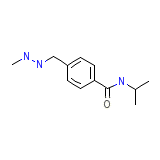Procarbazine hydrochloride




Procarbazine hydrochloride Brand names, Procarbazine hydrochloride Analogs
Procarbazine hydrochloride Brand Names Mixture
- No information avaliable
Procarbazine hydrochloride Chemical_Formula
C12H19N3O
Procarbazine hydrochloride RX_link
http://www.rxlist.com/cgi/generic3/procarb.htm
Procarbazine hydrochloride fda sheet
Procarbazine hydrochloride msds (material safety sheet)
Procarbazine hydrochloride Synthesis Reference
No information avaliable
Procarbazine hydrochloride Molecular Weight
221.299 g/mol
Procarbazine hydrochloride Melting Point
223 oC
Procarbazine hydrochloride H2O Solubility
1420 mg/L
Procarbazine hydrochloride State
Solid
Procarbazine hydrochloride LogP
1.234
Procarbazine hydrochloride Dosage Forms
Capsule
Procarbazine hydrochloride Indication
For use with other anticancer drugs for the treatment of stage III and stage IV Hodgkin's disease.
Procarbazine hydrochloride Pharmacology
Procarbazine is an antineoplastic in the class of alkylating agents and is used to treat various forms of cancer. Alkylating agents are so named because of their ability to add alkyl groups to many electronegative groups under conditions present in cells. They stop tumor growth by cross-linking guanine bases in DNA double-helix strands - directly attacking DNA. This makes the strands unable to uncoil and separate. As this is necessary in DNA replication, the cells can no longer divide. In addition, these drugs add methyl or other alkyl groups onto molecules where they do not belong which in turn inhibits their correct utilization by base pairing and causes a miscoding of DNA. Procarbazine is cell-phase specific for the S phase of cell division.
Procarbazine hydrochloride Absorption
Procarbazine is rapidly and completely absorbed.
Procarbazine hydrochloride side effects and Toxicity
LD50=785 mg/kg (orally in rats)
Procarbazine hydrochloride Patient Information
Procarbazine hydrochloride Organisms Affected
Humans and other mammals














